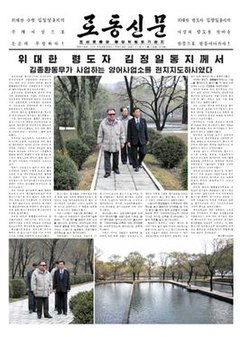Rodong Sinmun
 |
|
 |
|
| Type | Daily newspaper |
|---|---|
| Format | Broadsheet |
| Owner(s) | Workers Party of Korea |
| Publisher | Rodong News Agency |
| Editor-in-chief | Ri Yong-sik |
| Founded | 1945 |
| Political alignment | Juche, Songun |
| Headquarters | Pyongyang, North Korea |
| Circulation | 600,000 (as of 2015) |
| Website | www |
| Rodong Sinmun | |
| Chosŏn'gŭl | 로동신문 |
|---|---|
| Hancha | 勞動新聞 |
| Revised Romanization | Nodong Sinmun |
| McCune–Reischauer | Rodong Sinmun |
Rodong Sinmun (Korean: 로동신문, IPA: [ɾodoŋ ɕʰinmun], Workers' Newspaper) is a North Korean newspaper that is the official newspaper of the Central Committee of the Workers' Party of Korea. It was first published on November 1, 1945, as Chǒngro (Chosŏn'gŭl: 정로; Hancha: 正路; "right path"), serving as a communication channel for the North Korea Bureau of the Communist Party of Korea. It was renamed in September 1946 to its current name upon the steady development of the Workers' Party of Korea. Quoted frequently by the Korean Central News Agency (KCNA) and international media, it is regarded as a source of official North Korean viewpoints on many issues.
The English-language version of Rodong Sinmun was launched in January 2012.
Rodong Sinmun is published every day of the year and usually contains six pages. The newspaper has approximately 100 reporters.
Since 1996, Rodong Sinmun, the Korean Central News Agency, Minju Choson, and Joson Inmingun has published a joint New Year editorial that outlines the country's policies for the year. The editorials usually offer praise for the Songun policy, the government and leadership, and encourage the growth of the nation. They are also critical of the policies of South Korea, Japan, the United States and Western governments towards the country. On January 1, 2006, the agency sent out a joint-editorial from North Korea's state newspapers calling for the withdrawal of American troops from South Korea. While annual January 1 editorials are a tradition among the papers, that year's brought attention from Western media outlets, by calling for a "nationwide campaign for driving out the U.S. troops". The editorial made several references to Korean reunification. The 2009 editorial received similar attention, as criticism of United States policy was absent, and the admission of severe economic problems in the country. The editorial also made reference to denuclearisation on the Korean peninsula, in what analysts claimed was a "hopeful" sign. This was echoed again in its 2010 editorial, which called for an end to hostilities with the United States and a nuclear free Korean Peninsula.
...
Wikipedia
